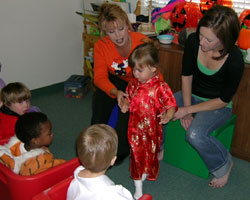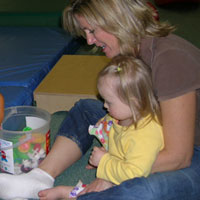Programs
Occupational Therapy Program
Occupational therapy helps children participate in their daily activities, or “occupations.” For children, this includes eating, self-care tasks, learning, playing, and interacting with their peers. Occupational therapists facilitate the development of the underlying skills that will enable children with delays to participate in everyday activities. Occupational therapy addresses a variety of areas including:
- Body awareness
- Motor Planning/Organizational skills
- Bilateral Coordination
- Visual Motor Skills
- Oral Motor Skills
- Fine Motor Skills
- Gross Motor Skills
- Self-Regulation/Attention
- Sensory Modulation
Sensory Integration Program
Sensory Integration is the ability to organize and integrate sensory information from our environment in a way that makes sense and allows us to function. Most people know about the five senses; touch, sight, hearing, smell and taste.
There are two more senses that are less well known; vestibular and proprioception. Vestibular is a movement and balance sense. Through receptors in our inner ears, our vestibular sense registers our movement and where our head is in space. Proprioception is the sense of body awareness that we obtain through receptors in our muscles and joints.
Sensory processing disorder occurs when sensory information from our environment is not interpreted or organized properly. Because of this, children who struggle with sensory processing difficulties may be unable to accurately respond to the demands of their environment. Sensory processing disorder can present itself in a number of ways.
Children can be under-responsive to sensory input, and therefore seem like they are slow to respond, show a high pain tolerance, appear clumsy, or have a slouched posture. Children who are over-responsive may avoid touching certain objects, avoiding certain foods or sounds, are fearful of falling or climbing, or may be easily distracted in noisy environments.
There are also children who seek out sensory information excessively, who are referred to as “sensory seekers.” These children appear to crave input, as they will continuously seek out activities that involve intense sensory input.
Center-based 'Mommy & Me' Program
The Progressive Steps center-based program offers a 1:3 therapist/child ratio.

By providing a low instructional ratio, children with special needs will receive individualized assistance in completing cognitive tasks, language and social skills goals. Children in the program range from 24 months-36 months of age. The Progressive Steps center-based program is offered to children in addition to other individual therapeutic services provided on a 1:1 basis (i.e.: speech therapy, physical therapy, occupational therapy, child development).
The center-based program offers parents and their children a variety of opportunities to participate in a preschool environment with their peers. Children will learn to transition without difficulty, understand and follow classroom routines, participate in circle time, gross motor play, self help skills, feeding skills, as well as engagement in age appropriate peer interaction. The therapists in the class will provide children with activities that excite and challenge each child based on individual goals. Praise is offered at every opportunity for a task completed to the best of the child's ability.
Parenting topics are discussed during the program to assist families with developmental concerns including appropriate language acquisition, behavior issues, and toilet training.
Overview
- Six children ages 24-36 months
- Parents, guardians, and childcare providers for participating children
- Two therapists with specialized training in sensory integration
Group Activities :
- Sensorimotor play in the gym: swings, slides, trampoline, obstacle courses, ball bath, etc.
- Cooperative play: turn taking during ball games, puzzle construction, obstacle courses, etc.
- Self Care: self-feeding at snack time, hand washing, dressing up in play clothes, etc.
- Music and Movement: parachute play, ring-around-the-rosy, dancing, etc.
- Circle Time: sing-a-longs, beanbag games, musical instruments, animal identification, etc.
- Arts and Crafts: finger painting, playdough, sponge painting, tissue paper collage, etc.
Developmental Skills Addressed:
- Self-regulation of behavior and mood
- Expressive and receptive language development
- Social interaction with peers and adults
- Following directions
- Attention to task
- Independent feeding, dressing, and personal hygiene
- Motor planning during gross and fine motor tasks
- Tactile processing
- Vestibular and proprioceptive processing
- Eye-hand coordination
- Auditory and visual processing
Parent/Caregiver Needs Addressed:
- Education in sensory integration and its role in their child's development
- Guidance in how to help their child learn vital developmental skills
- Opportunities to exchange information with and offer support to other parents
